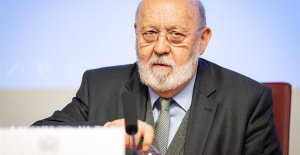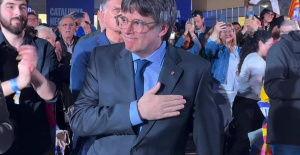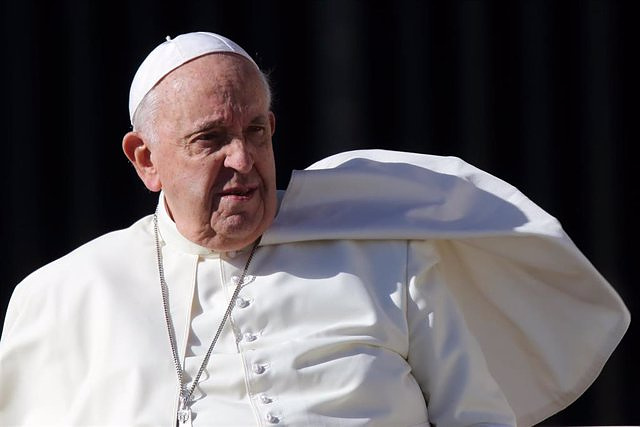ROMA, 18 Dic. (EUROPA PRESS) -
Pope Francis has approved a doctrinal document that allows the blessing of same-sex and other "irregular" couples as long as it does not imitate the rite of marriage.
According to the official Vatican portal 'Vatican News', with this declaration, the 'Fiducia supplicans', of the Dicastery for the Doctrine of the Faith, approved by the Pope, it will be possible to bless couples formed by people of the same sex, but on the sidelines of any ritualization and imitation of marriage.
Thus, the declaration explains that when faced with the request of two people to be blessed, even if their status as a couple is "irregular", it will be possible for the ordained minister to give his consent, but without this gesture containing elements even remotely similar to a marriage rite.
The document delves into the topic of blessings, distinguishing between ritual and liturgical blessings, and spontaneous blessings that are more similar to gestures of popular devotion. Precisely, in this second category is where the possibility of also welcoming those who do not live according to the norms of Christian moral doctrine but ask to be blessed is now contemplated.
'Fiducia suplicans' begins with an introduction by the prefect of the Dicastery, Cardinal Víctor Fernández, who explains that the declaration delves into the "pastoral meaning of the blessings", allowing "to expand and enrich their classical understanding" through a theological reflection. based on the pastoral vision of Pope Francis".
A reflection that, as he explains, "represents a true development with respect to what has been said until now about blessings", including the possibility "of blessing couples in an irregular situation and same-sex couples, without officially validating their status or modifying the perennial teaching of the Church on marriage at all.
After the first paragraphs, which recall the previous 2021 pronouncement, now expanded, the declaration presents the blessing in the sacrament of marriage declaring "inadmissible rites and prayers that may create confusion between what is constitutive of marriage" and " which contradicts it", to avoid recognizing in any way "as marriage something that is not".
Thus, it is reiterated that, according to "perennial Catholic doctrine", only sexual relations within marriage between a man and a woman are considered licit.
A second chapter analyzes the meaning of the various blessings, which are destined for people, objects of devotion, and places in life. Remember that "from a strictly liturgical point of view," blessing requires that what is blessed "be in accordance with the will of God expressed in the teachings of the Church."
In any case, it is specified that whoever asks for a blessing "shows himself in need of the saving presence of God in his history", because he expresses "a request for help from God, a plea for a better life" which is why he adds that this request It must be welcomed and valued "outside a liturgical framework", when it is found "in an area of greater spontaneity and freedom."
In this way, he points out that, considered from the perspective of popular piety, "blessings must be valued as acts of devotion" and adds that, to confer them, it is not necessary, therefore, to require a "prior moral perfection" as a precondition. .
Going deeper into this distinction, based on Pope Francis' response to the cardinals' 'dubia' published last October, in which he asked to discern the possibility of "forms of blessing, requested by one or several people, that do not convey an erroneous conception of marriage," the document states that this type of blessing "is offered to all.
Thus, it is indicated that there are "various occasions in which people come spontaneously to ask for a blessing, whether on pilgrimages, in sanctuaries or even on the street when they meet a priest", and in such blessings "no one can be excluded ".
In this sense, he points out that, since it is prohibited to activate "procedures or rites" for these cases, the ordained minister can join in the prayer of those people who, "although they are in a union that in no way can be compared to marriage, wish to entrust themselves to the Lord and his mercy, invoke his help."
The third chapter of the declaration opens the possibility of these blessings, which represent a gesture towards those who "recognizing themselves helpless and in need of their help, do not claim the legitimacy of their own status, but pray that all that is true, good and humanly valid in their lives and relationships, be invested, sanctified and elevated by the presence of the Holy Spirit.
Such blessings, he notes, should not be standardized, but rather entrusted to "practical discernment in a particular situation." Furthermore, it is proposed that "in the brief prayer that may precede this spontaneous blessing, the ordained minister could ask for peace, health, a spirit of patience, dialogue and mutual help, but also the light and strength of God to to be able to fully fulfill his will."
It is also clarified that, to avoid "any form of confusion and scandal," when a same-sex couple asks for the blessing, "it will never be performed at the same time as, nor in connection with, civil union rites." "Not even with the clothes, gestures or words typical of a marriage." Thus, it is proposed that this type of blessing "can find its place in other contexts, such as a visit to a sanctuary, a meeting with a priest, a prayer recited in a group or during a pilgrimage."

 Exploring Cardano: Inner Workings and Advantages of this Cryptocurrency
Exploring Cardano: Inner Workings and Advantages of this Cryptocurrency Seville.- Economy.- Innova.- STSA inaugurates its new painting and sealing hangar in San Pablo, for 18 million
Seville.- Economy.- Innova.- STSA inaugurates its new painting and sealing hangar in San Pablo, for 18 million Innova.- More than 300 volunteers join the Andalucía Compromiso Digital network in one month to facilitate access to ICT
Innova.- More than 300 volunteers join the Andalucía Compromiso Digital network in one month to facilitate access to ICT Innova.-AMP.- Ayesa acquires 51% of Sadiel, which will create new technological engineering products and expand markets
Innova.-AMP.- Ayesa acquires 51% of Sadiel, which will create new technological engineering products and expand markets Marc Márquez returns to pole in Jerez
Marc Márquez returns to pole in Jerez The CIS carries out a quick survey on Sánchez's letter to measure the reaction of citizens
The CIS carries out a quick survey on Sánchez's letter to measure the reaction of citizens 12M.- Puigdemont to Sánchez and Illa: "This is not about the future of the PSOE! What have you believed?"
12M.- Puigdemont to Sánchez and Illa: "This is not about the future of the PSOE! What have you believed?" Díaz proclaims that "the Government is not going to bow down" and asks not to be "on the defensive and locked in" against the right
Díaz proclaims that "the Government is not going to bow down" and asks not to be "on the defensive and locked in" against the right How Blockchain in being used to shape the future
How Blockchain in being used to shape the future Not just BTC and ETH: Here Are Some More Interesting Coins Worth Focusing on
Not just BTC and ETH: Here Are Some More Interesting Coins Worth Focusing on UPV students build a prototype of a wooden house to move to Equatorial Guinea
UPV students build a prototype of a wooden house to move to Equatorial Guinea The UA opens the call for the Impulso 2024 Awards for the best innovative business initiatives
The UA opens the call for the Impulso 2024 Awards for the best innovative business initiatives ALI, virtual assistant from Alicante, internationally recognized by the OECD
ALI, virtual assistant from Alicante, internationally recognized by the OECD Retrópolis brings the golden age of video games and computing to the UPV
Retrópolis brings the golden age of video games and computing to the UPV A million people demonstrate in France against Macron's pension reform
A million people demonstrate in France against Macron's pension reform Russia launches several missiles against "critical infrastructure" in the city of Zaporizhia
Russia launches several missiles against "critical infrastructure" in the city of Zaporizhia A "procession" remembers the dead of the Calabria shipwreck as bodies continue to wash up on the shore
A "procession" remembers the dead of the Calabria shipwreck as bodies continue to wash up on the shore Prison sentences handed down for three prominent Hong Kong pro-democracy activists
Prison sentences handed down for three prominent Hong Kong pro-democracy activists ETH continues to leave trading platforms, Ethereum balance on exchanges lowest in 3 years
ETH continues to leave trading platforms, Ethereum balance on exchanges lowest in 3 years Investors invest $450 million in Consensys, Ethereum incubator now valued at $7 billion
Investors invest $450 million in Consensys, Ethereum incubator now valued at $7 billion Alchemy Integrates Ethereum L2 Product Starknet to Enhance Web3 Scalability at a Price 100x Lower Than L1 Fees
Alchemy Integrates Ethereum L2 Product Starknet to Enhance Web3 Scalability at a Price 100x Lower Than L1 Fees Mining Report: Bitcoin's Electricity Consumption Declines by 25% in Q1 2022
Mining Report: Bitcoin's Electricity Consumption Declines by 25% in Q1 2022 Oil-to-Bitcoin Mining Firm Crusoe Energy Systems Raised $505 Million
Oil-to-Bitcoin Mining Firm Crusoe Energy Systems Raised $505 Million Microbt reveals the latest Bitcoin mining rigs -- Machines produce up to 126 TH/s with custom 5nm chip design
Microbt reveals the latest Bitcoin mining rigs -- Machines produce up to 126 TH/s with custom 5nm chip design Bitcoin's Mining Difficulty Hits a Lifetime High, With More Than 90% of BTC Supply Issued
Bitcoin's Mining Difficulty Hits a Lifetime High, With More Than 90% of BTC Supply Issued The Biggest Movers are Near, EOS, and RUNE during Friday's Selloff
The Biggest Movers are Near, EOS, and RUNE during Friday's Selloff Global Markets Spooked by a Hawkish Fed and Covid, Stocks and Crypto Gain After Musk Buys Twitter
Global Markets Spooked by a Hawkish Fed and Covid, Stocks and Crypto Gain After Musk Buys Twitter Bitso to offset carbon emissions from the Trading Platform's ERC20, ETH, and BTC Transactions
Bitso to offset carbon emissions from the Trading Platform's ERC20, ETH, and BTC Transactions Draftkings Announces 2022 College Hoops NFT Selection for March Madness
Draftkings Announces 2022 College Hoops NFT Selection for March Madness























